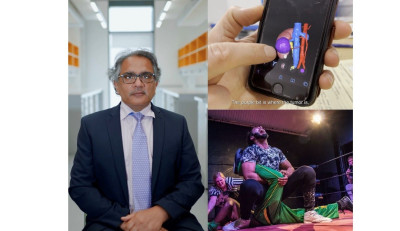A professional wrestler who made a documentary about his kidney cancer journey hopes a new NHS campaign will mean earlier diagnoses for other people with the disease.
Adil Malik was just 25 years old when he spotted blood in his urine and a friend encouraged him to seek medical advice.
“I remember taking a break from the game and going to the toilet, seeing blood and thinking that maybe it was just an infection, said Adil, now 28, from Walthamstow. “I mentioned it to a friend while we were gaming online and he said I should go to the doctor.”
Initially Adil was given antibiotics but when they didn’t seem to be working, he called 111 and went to the A&E at his local hospital Whipps Cross.
Scans revealed a lesion on his kidney and Adil was referred to the Royal Free Hospital which has a specialist kidney cancer service.
Adil said: “Being 25, you think you are indestructible. I was a wrestler, I was fit and healthy. I wondered if I was ever going to wrestle again. But the challenge was to remain positive.”
Once at the Royal Free Hospital, Adil was scheduled for surgery. Surgeons Faiz Mumtaz (pictured below left) and Prasad Patki removed his kidney with the help of a surgical robot, finding an 8cm tumour.

Adil said: “They managed to catch it in time, it hadn’t spread anywhere, so I didn’t need any further treatment. All the staff at the Royal Free Hospital were brilliant – I had a real connection with the team – but I wanted to say thank you to everyone who looked after me.
“I come in for check ups every now and then to make sure the cancer hasn’t returned and I am in the best shape of my life. I am back wrestling which is great – I am doing something that I love.”
Following his successful treatment decided to make a documentary – Wrestling with Cancer - about this experience to help spread the word about getting potential symptoms of cancer checked by a doctor.
Adil said: “The film was received really well and it was shown in a few film festivals and it got a lot of publicity for this cause which was the reason I wanted to do it.”
And now Adil is part of a new NHS England campaign, in which urinal mats in pubs and football grounds will carry messages aimed at encouraging men to see their doctor if they have any symptoms of bladder, kidney or prostate cancer, including blood in their pee or a burning sensation when they urinate.
“I really want to help spread the message,” said Adil. “If it can happen to me, it can happen to anyone. I should have got mine checked out straight away, instead of waiting a few weeks. I know men often don’t like going to the doctor but it’s really important as it could be something serious. If I hadn’t caught my cancer in time, who knows what would have happened.”
Professor Faiz Mumtaz added: “I was delighted that Adil made a great recovery. Getting his symptoms checked by a doctor saved his life – and it’s vital that anyone with similar symptoms or who notices blood while peeing should also get medical advice. With cancer, the earlier you catch it, the greater the chance of a recovery so go to your GP if you’re worried about anything.”
 Translate
Translate